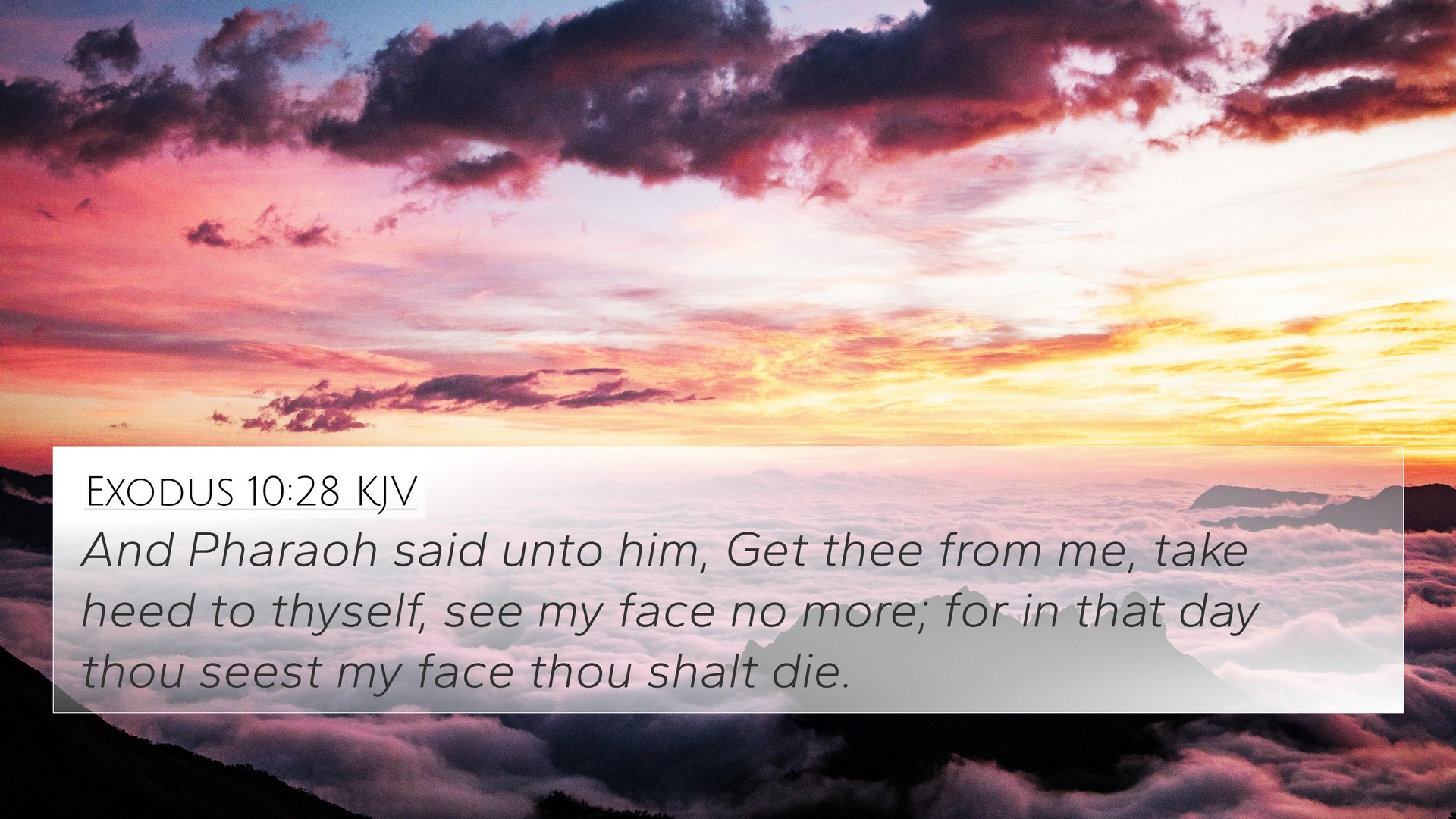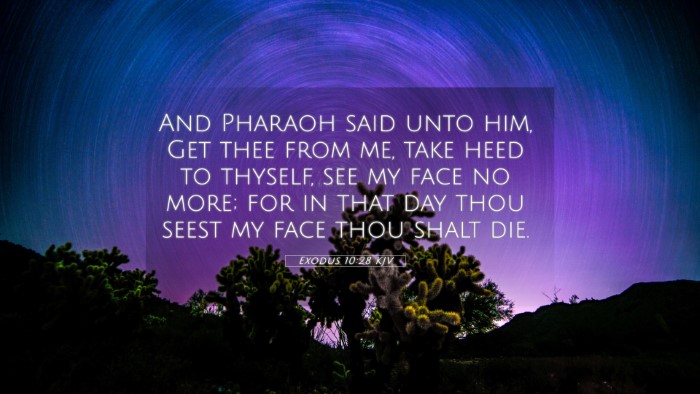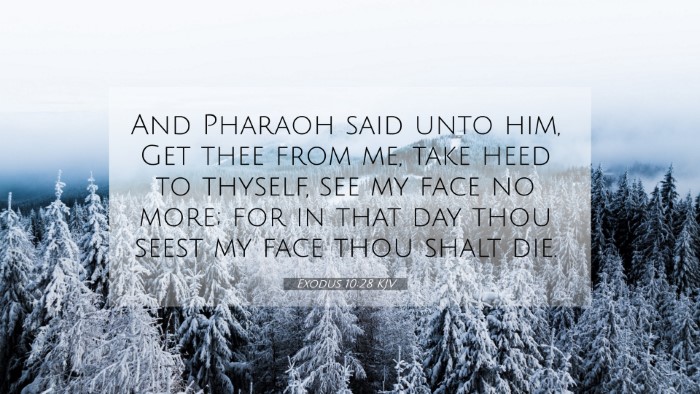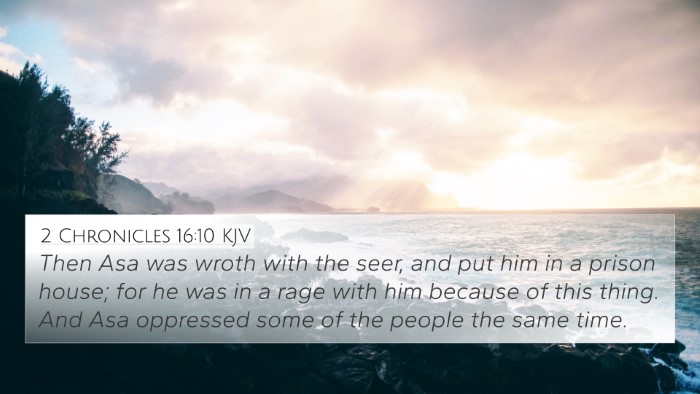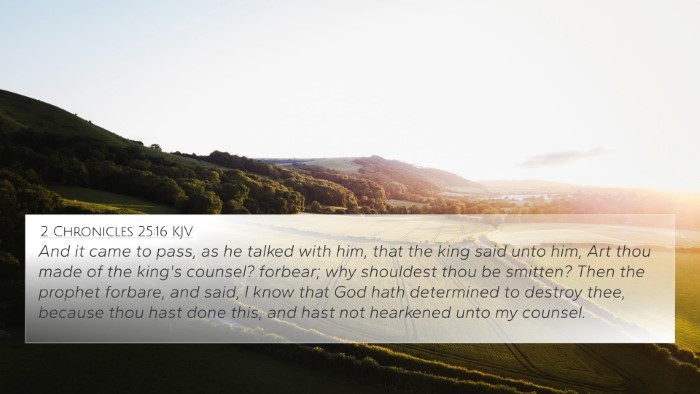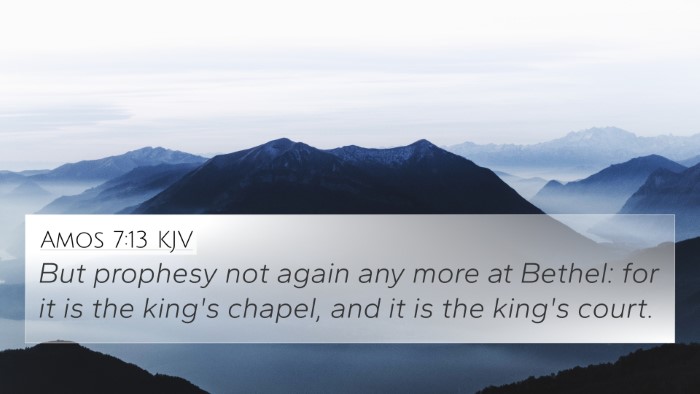Understanding Exodus 10:28
Exodus 10:28: "And Pharaoh said unto him, Get thee from me, take heed to thyself, see my face no more; for in that day thou seest my face thou shalt die."
This verse captures a crucial moment in the narrative of Moses and Pharaoh during the plagues in Egypt. Pharaoh's words reveal his anger and rejection of Moses' message from God. Below, we will explore the meaning of this verse with insights from public domain commentaries, highlighting the connections and themes that can be drawn from it.
Interpretation and Commentary
The commentaries of Matthew Henry, Albert Barnes, and Adam Clarke provide profound insights into this verse:
-
Matthew Henry:
Henry emphasizes Pharaoh's hardened heart and his persistence in defiance. His command illustrates the rejection of divine authority and the consequences of rebellion against God's will. Pharaoh’s threat signifies a deepening animosity towards Moses, showing how the closer one gets to divine will, the more aggressive the opposition can become.
-
Albert Barnes:
Barnes discusses the implications of Pharaoh's declaration. He notes that Pharaoh, in his pride, thought he could intimidate Moses and dismiss the God of Israel's demands with threats of death. This was a grave miscalculation, as divine power does not yield to earthly threats. Pharaoh's ultimate fate, as we know from the narrative, shows the folly of standing against God.
-
Adam Clarke:
Clarke provides historical context, explaining the significance of Moses' presence in Pharaoh's court and the weight of his warnings. He highlights that Pharaoh’s reaction signifies the culmination of a long-standing struggle between the will of God and the ambitions of man, noting that the king's refusal to heed divine warnings is a recurring theme throughout scripture.
Thematic Connections and Cross-References
This verse provides numerous opportunities for cross-referencing, illustrating how interconnected the scripture is. Here are some relevant Bible cross-references:
- Exodus 9:17: Pharaoh's pride in the context of the plagues reveals the character of rebellion against God.
- Exodus 5:2: Pharaoh's initial response to Moses reveals his lack of acknowledgment of God.
- Romans 1:18-21: This passage discusses humanity's rebellion against God and parallels Pharaoh’s actions.
- Hebrews 3:15: A warning against hardening one’s heart, akin to Pharaoh’s stance.
- Proverbs 29:1: The fate of one who is often reproved but remains obstinate mirrors Pharaoh’s stubbornness.
- 2 Corinthians 6:17: The call to separate from disobedience relates to Moses' difficult position in Egypt.
- Matthew 10:28: A New Testament echo of the idea of fearing God over man.
Exploring the Cross-Referencing System
Understanding Exodus 10:28 within its biblical context illustrates the importance of cross-referencing. Here are some tools and methods for effective Bible cross-referencing:
- Bible Concordance: A useful tool to find terms and explore related verses.
- Bible Cross-Reference Guide: Essential for navigational study through scriptures.
- Cross-Reference Bible Study: Suggested method for connecting themes and understanding context.
- How to Use Bible Cross-References: Resources for systematic cross-referencing across texts.
- Bible Chain References: Techniques for linking verses thematically.
Conclusion
Exodus 10:28 serves as a poignant reminder of the tension between divine authority and human defiance. By leveraging tools for cross-referencing, believers can explore inter-Biblical dialogues and discover deeper insights into not only this verse but the overarching themes of God's sovereignty and human responsibility throughout scripture. This verse invites readers to reflect on their own response to God’s revelations and the importance of not hardening one’s heart as Pharaoh did.
